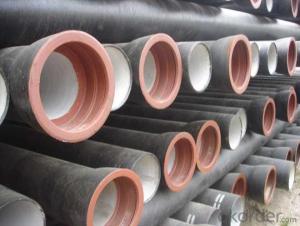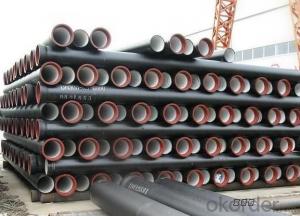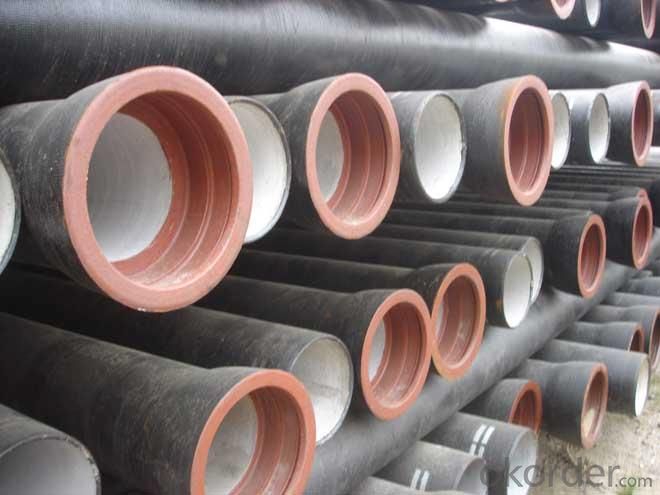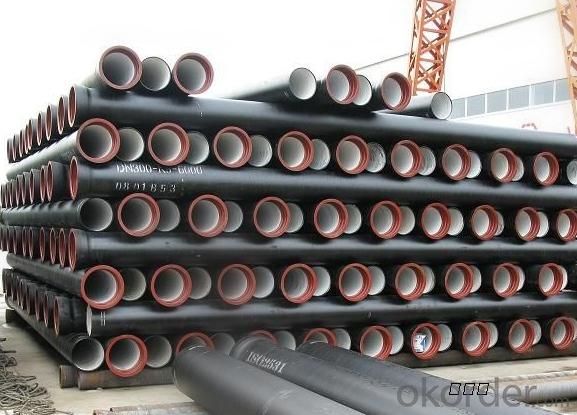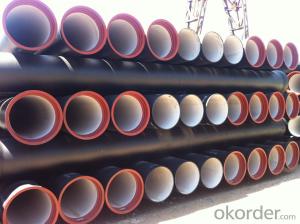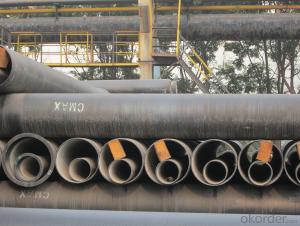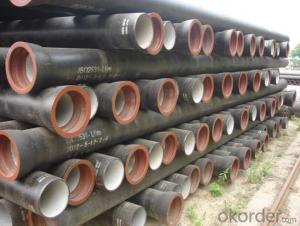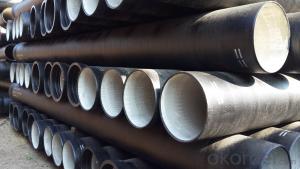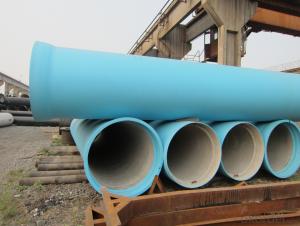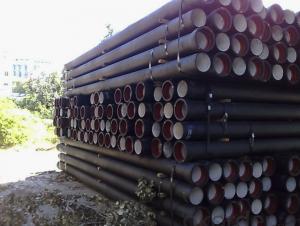Ductile Iron Pipe of China DN150-DN600 EN545/EN598 High Quality
- Loading Port:
- China main port
- Payment Terms:
- TT or LC
- Min Order Qty:
- 20 m.t.
- Supply Capability:
- 200000 m.t./month
OKorder Service Pledge
OKorder Financial Service
You Might Also Like
1,Ductile Iron Pipe Description :
DI pipe fittings are manufactured according to ISO 2531 or BS EN545 or BS4772 FOR POTABLE WATER ,internal is cement lining or wet epoxy coating;External is zinc plus bitumen or wet epoxy coating. We also manufacture ductile iron fittings with fusion bonded epoxy both inside and outside. All the producets are sutible to water pipes fields.
2,Main Features of the Ductile Iron Pipe:
·High yield strength
·High tensile Strength
·High corrosion resistance
·Pressure Resistence
·Anti-corrosion
·Installation is convenient
·Satisfy the highest hygienic standards
. Length: 6m or cut into 5.6m, 5.7m, 5.8m
. Internal Lining: Cement, conform to ISO4179
. External coating: Zinc + Bitumen, conform to ISO8179
. Note: The gaskets, bolts & nuts are supplied respectively as your special requirement
3,Ductile Iron Pipe Images:
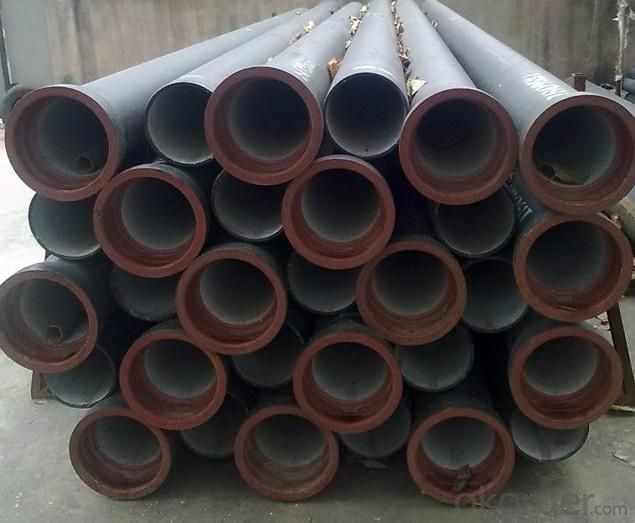
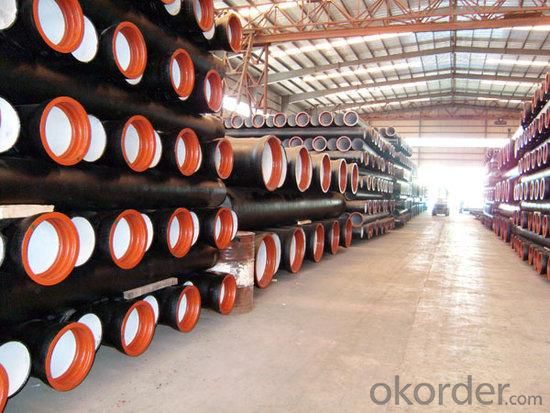
4. Ductile Iron Pipe Specification
Surface Finishes:Bare, Oiled, Mill Varnish, Galv,FBE, FBE Dual, 3LPE, 3LPP, Coal Tar,Concrete Coating and Tape Wrap
End Finishes: Beveled, Square Cut, Threaded, hat
Additional Services: Internal Coating
Packaging: packed in bag, plastic bag, steel strip, steel wire,double wire, iron box, wooden box,
tarpaulin, plastic sheeting
Inspection: MOODY SGS BV GL DNV ABS LIOYD’S
Test :X-ray, UT, magnetic particle,inspection,hydrostatic test.
Processing service :Beveling, Threading, Slotting, Cut-to length, Bends, Quench and Temper, Fabrication, Double-jointing and On-site assistance
Documentary MTC: material certification,Origin certification, CI or PI,Test Report, export licence, handling order, B/L,insurance policy,shipping instructions, contract, packing list etc.
Internal lining: ductile iron pipes shall have an internal cement mortar lining in acc with ISO4179.
External coating: ductile iron pipes shall be externally coated with metallic zinc spray plus a further layer of resin painting to ISO8179.
Gasket: 100% SBR/NBR/EPDM rubber gasket in accordance with ISO4633.
Payment term: L/C, T/T.
Packing: In bulk vessel or in container
5.FAQ:
We have organized several common questions for our clients,may help you sincerely:
1.Q: Why would you choose ductile iron pipe rather than other pipe materials?
A:The reasons are obvious for that not only ductile iron pipe possesses the inherent strength and flexibility of ductile iron, combined with proven corrosion protection systems, but also the cost savings can be achieved from design to installation and commissioning.
2.Q:Why can you guarantee the inner of pipes can’t be corroded?
A: High alumina cement mortar lining and sulphate-resistant cement mortar lining. These two special linings are applicable to inner anti-corrosion for sewage pipes, improving resistance to erosion of the sewage components.
- Q: Ductile iron pipe converter, steel transition DN100 turn 100, what is the specific accessories name? Can you supply photos?
- 1. corrosion resistance: in addition to some strong oxidizing substances, polyethylene material pipe fittings can effectively prevent oxidation material corrosion.2., leakage prevention: the use of hot melt and electric melting technology, the pipe interface can be tightly linked together, there is no leakage.
- Q: How do ductile iron pipes perform in cold weather conditions?
- Ductile iron pipes perform well in cold weather conditions due to their exceptional strength and durability. Unlike other materials, ductile iron pipes have a high resistance to freeze-thaw cycles, preventing them from cracking or breaking in freezing temperatures. Additionally, the material's flexibility allows for minimal expansion and contraction, ensuring stability even in extreme cold. Overall, ductile iron pipes are a reliable choice for cold weather environments.
- Q: Can ductile iron pipes be used for trenchless installation methods?
- Yes, ductile iron pipes can be used for trenchless installation methods. Trenchless installation methods are techniques used to install underground pipes without the need for extensive digging or trenching. Ductile iron pipes are a strong and durable choice for these methods due to their high tensile strength and flexibility. They can be installed using various trenchless techniques such as horizontal directional drilling (HDD), pipe bursting, and slip lining. These methods allow for efficient and cost-effective installation of ductile iron pipes without disrupting the surrounding environment. Additionally, the corrosion resistance of ductile iron pipes makes them suitable for trenchless installations in various soil conditions and environments.
- Q: What are the typical lengths of ductile iron pipes?
- The typical lengths of ductile iron pipes range from 18 feet to 20 feet, although shorter lengths such as 10 feet or longer lengths such as 40 feet can also be found depending on specific project requirements.
- Q: How do ductile iron pipes handle dynamic loads?
- Ductile iron pipes possess remarkable strength and durability, enabling them to effectively manage dynamic loads. These pipes exhibit a high resistance to bending and can endure the pressure and stress exerted on them when exposed to dynamic loads, such as water hammer or ground movement. The distinctive composition of ductile iron, which includes a small amount of carbon and the addition of magnesium, produces a structure that is both robust and flexible. This combination allows the pipes to flex when impacted by dynamic loads, rather than fracturing or breaking like other materials. Moreover, ductile iron pipes demonstrate a superior impact resistance, enabling them to absorb and distribute the energy generated by dynamic loads throughout their structure. This capability to dissipate energy effectively minimizes the risk of pipe failure and ensures the longevity of the pipeline system. Additionally, ductile iron pipes exhibit excellent stress distribution properties, ensuring that the load applied to the pipes is evenly dispersed along their length. This feature serves to prevent localized stress concentrations and reduces the likelihood of damage or failure. To summarize, ductile iron pipes are specially designed to handle dynamic loads with utmost efficiency. Their strength, flexibility, impact resistance, and stress distribution properties make them highly suitable for applications where dynamic loads are a concern, guaranteeing the reliability and longevity of the pipeline system.
- Q: Are ductile iron pipes suitable for deep burial installations?
- Indeed, deep burial installations can accommodate ductile iron pipes. These pipes possess remarkable strength and endurance, rendering them highly suitable for subterranean purposes. They possess the ability to withstand the immense pressure exerted by soil as well as any external forces that may arise. Moreover, ductile iron pipes exhibit exceptional resistance to corrosion, a vital characteristic for ensuring long-lasting performance in buried settings. Furthermore, their flexibility enables them to endure ground movements and settle without fracturing. All in all, ductile iron pipes represent a dependable and economically efficient option for deep burial installations.
- Q: Can ductile iron pipes be used in contaminated soil conditions?
- Indeed, contaminated soil conditions pose no obstacle to the utilization of ductile iron pipes. Ductile iron boasts exceptional attributes such as robustness, endurance, and resistance to corrosion, rendering it appropriate for diverse soil conditions, even those tainted by chemicals or other harmful substances. The material's resistance to corrosion guarantees the pipes' ability to endure the adverse conditions and sustain their structural integrity throughout time. Nevertheless, it is crucial to take into account the nature and extent of soil contamination and seek guidance from specialists to ascertain whether supplementary protective measures or coatings are necessary to ensure the pipes' enduring efficiency.
- Q: What is the difference between flexible joint mechanism and seismic cast iron pipe DN100 and ductile iron pipe?
- The ball compressive strength of ductile iron pipe is much higher than that of cast iron pipes, buried in the ground, the car is not easy to be crushed.
- Q: Method for cutting large diameter ductile iron pipe
- When the oxygen and acetylene volume ratio is greater than 1.2, is formed. As more oxygen, burning, the flame length is shortened obviously, cone tapered inner flame almost disappeared, and a strong desire. Making due to oxygen, the oxidation of metal, so are not widely used, only used for welding of brass, to prevent evaporation of zinc.
- Q: Can ductile iron pipes be used for irrigation systems in agricultural fields?
- Ductile iron pipes are indeed suitable for use in agricultural fields for irrigation systems. Their durability, strength, and corrosion resistance are well-known, making them an excellent choice for a variety of applications, including irrigation systems. These pipes can withstand high pressures and effectively transport water for irrigation purposes. Moreover, the ductile iron material is resistant to various environmental factors like UV rays, soil chemicals, and temperature changes, ensuring that the pipes have a long lifespan. Additionally, ductile iron pipes exhibit excellent flow characteristics, enabling efficient water distribution across the agricultural fields. In summary, ductile iron pipes offer a reliable and sturdy option for irrigation systems in agricultural fields, delivering a sustainable and efficient solution for water distribution.
Send your message to us
Ductile Iron Pipe of China DN150-DN600 EN545/EN598 High Quality
- Loading Port:
- China main port
- Payment Terms:
- TT or LC
- Min Order Qty:
- 20 m.t.
- Supply Capability:
- 200000 m.t./month
OKorder Service Pledge
OKorder Financial Service
Similar products
Hot products
Hot Searches
Related keywords
